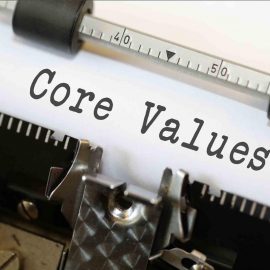

This article is an excerpt from the Shortform book guide to "The Squiggly Career" by Helen Tupper and Sarah Ellis. Shortform has the world's best summaries and analyses of books you should be reading.
Like this article? Sign up for a free trial here.
What are your core values? How can they guide you toward success in a nonlinear career?
Authors Helen Tupper and Sarah Ellis emphasize the importance of identifying and living by your core values. These principles serve as a compass for decision-making and help you navigate opportunities. They also enhance your ability to collaborate with others.
Read more to discover your core values and learn how to leverage them.
Your Core Values
What are your core values? It’s important that you have clarity about them. Tupper and Ellis say you must use these values to guide your actions if you want to succeed in a nonlinear career. Core values are the most important things to you, and knowing what they are is crucial for a few reasons.
First, core values provide a simple decision-making system—if something doesn’t align with your values, it’s not for you. This will help you easily sift through opportunities so you can find what’s right for you. Further, making decisions with less deliberation allows you to more quickly move toward your goals and find a job you’re passionate about.
Second, having a strong commitment to your values will help you understand other people—how their decisions and actions are based on their commitment to their values. This will increase your ability to collaborate with others. Collaboration and decisiveness are both skills that make you a timeless asset in ever-changing organizations.
(Shortform note: In Awaken the Giant Within, Tony Robbins reiterates the importance of identifying your core values in life to effect fulfillment, inner peace, certainty, joy, and effective connection with others. However, he warns that living by your core values can cause enduring frustration and unhappiness if they contradict each other. For example, if two of your core values are connection and independence, you may continually struggle in relationships—you want to connect and collaborate, but you also want to do your own thing. To ensure you achieve the authors’ desired results, be sure none of your core values contradict each other.)
Identify Your Core Values
Tupper and Ellis explain that core values are the most important things in your life that you prioritize over all else. Therefore, you can have only three to five core values. Further, core values are universal. They’ll guide your actions and decisions in all areas of your life, whether personal or professional. The authors recommend following a four-part exercise to identify your values.
(Shortform note: In Dare to Lead, Brené Brown reiterates the importance of only having a few core values. She elaborates that this is crucial because having too many values makes them meaningless—they become feel-good words rather than principles that truly guide your behaviors, intentions, and commitments. Further, Brown recommends narrowing your core values even further than the authors—she says you should have only two.)
First, the authors say to consider all the jobs you’ve done in your life. How happy or unhappy did you feel in each one and why? Based on the best and worst job experiences you’ve had, what are three things you require to be happy and three things you want to avoid at all costs?
Second, evaluate your previous response and consider what’s most important to you about four factors: the people you work with, the roles you perform, the company you work for, and your work environment. Which factors are more or less important to you?
| Evaluate Your Life to Identify Your Values While the authors’ approach to identifying core values is career-focused, Russ Harris provides a more general, and scientifically backed, approach to identifying values in The Happiness Trap. First, while the authors recommend analyzing values under the domain of career and in relation to four factors, Harris recommends considering values in four domains identified by psychologists—work being only one of them. You should also consider your values under the domains of relationships, personal development and wellness, and leisure. Then, Haris recommends asking yourself numerous questions to identify values in each domain. For example, under the work domain, ask yourself: What kind of person do you want to be? If you could be that person without obstacles, how would you treat people and behave? What kind of relationships are important to you? What skills or knowledge do you want to gain? |
The third step of Tupper and Ellis’s exercise is to brainstorm a list of 10 traits that encompass the different concepts you’ve recorded in the previous steps. For example, if something important to you is being friends with your coworkers, you might want to write something like “authenticity.”
(Shortform note: This tool sorts 230 core values into 12 categories and may be helpful for drawing connections between values and combining them into core values. So, if most of your values seem to fall under the category of feelings, consider the different core values under this category and select the one you feel best represents the values you’ve outlined.)
(Shortform note: The authors provide an original list of 72 example values in the book.)
Finally, the authors say to identify your core values from the list of traits by weighing each trait against the others to identify which is more important. To start, compare trait one to trait two and mark a check next to the more important one. Then compare trait one to trait three and so on until you’ve reached trait 10. For round two, compare trait two to traits 3-10. Repeat the process for each trait until they’ve all been weighed against each other. At the end of the exercise, the traits with the most checks will indicate your core values.
(Shortform note: You can use this chart to help complete your values analysis digitally. To use this tool, first replace the 10 value labels with the 10 values you’ll compare. Then, move down each row comparing the value next to the “row 1” indication to the value indicated in the top of the chart. If the value of that row is more important, mark it with a 1, if it’s not, leave it empty. Then, tally the 1’s in each row and mark the total for each value in the “total” column on the right to determine your top-ranking values.)
Once you have your core values, the authors add, define exactly what they mean to you and what they require you to do. For example, you might define your core value of “genuine connection” as “relationships and environments where you can be your authentic self and speak your mind without feeling pressure to hold back or be something you’re not, and where others do the same.” This core value might require you to leave relationships and work environments where others or the organization are inauthentic, or where you feel pressure to censor your authenticity.
(Shortform note: Brené Brown also recommends defining your values and what they require you to do in Dare to Lead. To be even more specific, she recommends including the following elements in your definition: several behaviors that support the value, behaviors that would go against the value, and a few examples of moments of integrity where you exemplified this value.)
Leverage Your Values
The authors explain that identifying your values isn’t as simple as doing an exercise—you may realize over time that what you prioritize in real life differs from what you identified on paper. As such, you must regularly reflect on your daily life and how your core values play into it—how many of your core values can you remember off the top of your head and how often are they contributing to your life? If you find that one of your core values on paper isn’t a core value in real life, you should reevaluate.
(Shortform note: If you find yourself having to regularly reevaluate your core values, you may be confusing goals with values. In The Happiness Trap, Harris explains that this is a common mistake people make when identifying their values—especially in Western societies, which tend to be more concerned with status and achievement. For example, if one of your values is financial stability you may find this “value” is no longer relevant in guiding your actions once you’ve attained wealth—this is because it’s a goal. Whereas goals are objectives that can be considered “completed,” values dictate ongoing behavior.)
Further, the authors recommend making the effort to integrate your values into your life—especially in areas that may stray from your values. The authors say that when decisions arise, you should use your values to guide your choices. For example, in prioritizing authenticity, you may have to decide between agreeing with someone to maintain peace or speaking your mind and risking conflict. Following your values would require you to speak your mind respectfully.
(Shortform note: In The Six Pillars of Self-Esteem, Nathaniel Branden explains that living by your values is especially important because when you fail to do so, you compromise your integrity. When this happens, you end up damaging your self-respect and self-esteem—both of which directly contradict Tupper and Ellis’s third ability: self-confidence. Branden says that, to regain integrity if you accidentally act against your values, take responsibility for your behavior and the consequences, do what you can to reduce any damage you’ve caused, examine why you did what you did, and commit to integrity in the future.)
Exercise: Leverage Your Values
The authors explain that succeeding in a nonlinear career requires you to identify and live by your values. In this exercise, we’ll identify how you can start integrating your values into your life.
- List the core values that you identified in the exercise recommended by the authors.
- List a big decision you need to make in the upcoming months. Which value(s) do you think will be the most relevant to making the right decision?
- Now, what would it look like to align your decision with the relevant values? What possible choices could you make pertaining to this decision that would cause you to contradict your values? Use your answers to inform your choices and behavior.

———End of Preview———
Like what you just read? Read the rest of the world's best book summary and analysis of Helen Tupper and Sarah Ellis's "The Squiggly Career" at Shortform.
Here's what you'll find in our full The Squiggly Career summary:
- How the nature of work and career paths has changed dramatically since the early 2000s
- The five abilities workers need to succeed in today’s environment
- Why climbing the corporate ladder might not be for you






